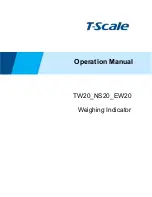
PCB Load & Torque, Inc.
Toll-Free in USA 866-684-7107
716-684-0001
www.pcbloadtorque.com
DUAL BRIDGE LOAD CELL OPERATION MANUAL
3
3.2 Standard Components
The following figure describes the standard components of the
dual bridge fatigue-rated load cells.
3.3 Optional Components
The following figure describes the optional components of the
dual bridge fatigue-rated load cells.
NOTE: Connector protectors are standard on 8” and 11”
models.
Table 3 describes the available optional components
NOTE: Pre-tension studs include the threaded stud and the
jam nut.
4.0 MECHANICAL INSTALLATION
Standard components of the dual bridge fatigue-rated load
cells have all been installed to factory specified values for
optimum performance. The following mechanical installation
instructions should be observed if optional components are to
be used.
4.1 Mounting Bases
All low-profile load cells are calibrated and supplied with a
factory installed standard mounting base. An optional
custom (customer supplied) mounting base can, with special
arrangements, be installed and used for calibration.
However, there will be an extra charge for removal of the
standard base, and installation of the load cell on the
customer’s base / fixture.
NOTE: To insure catalog performance specifications are met
the customer’s supplied fixture or base must be flat to
within 0.0002 inch and provide similar stiffness and
hardness to a factory base.
Unless otherwise specified/requested, the base and load cell
are calibrated as a unit. It is important to note that the
performance of the load cell may be affected if the factory-
installed mounting base is removed or modified.
4.2 Mounting Load Cell to a Standard Base or
Custom Fixture
If the load cell is to be mounted to a custom base or fixture, it
is necessary to consider the following:
1.
The thickness of the new base or fixture must not be
any thinner than the original base supplied with the
load cell. Materials used must have the same
temperature coefficient of expansion (for example,
4140 Steel or 2024-T4 Aluminum for 250,500 and
1,000 capacity aluminum cells).
2.
The mounting surface must be flat (within 0.0002
inches), and steel fixtures must have a hardness of
Rockwell C 33 to 37.
3.
The threaded holes and under-head of the fasteners
must be lightly lubricated with 30 weight oil or
equivalent prior to tightening the mounting bolts.
4.
Refer to Table 4 for the final tightening torque
required for each bolt size.
5.
Tighten the bolts in an incremental cross pattern with
the following sequence: start with all bolts finger
tight followed by 25%, 50% and finally 100% of the
required torque being applied.
Load Cell
Tension
Base
Connector A
Connector B
Connector
Protector
Pre-Tension
Stud
Pre-Tension
Stud
Jam Nut
Jam Nut
Figure 2
– Standard Components
Figure 3
– Optional Components
Item Number
Item Description
084A40
Lifting Rings (side), 1411 Series
084A41
Lifting Plug (top), 1411 Series
084A55
Pre-Tension Stud (5/8”-18 Thread), 1403 Series
084A56
Pre-Tension Stud (1 ¼”-12 Thread), 1404 Series
084A57
Pre-Tension Stud (1 ¾”-12 Thread), 1408 Series
084A58
Pre-Tension Stud (2 ¾”-8 Thread), 1411 Series
084A59
Pre-Tension Stud (2 ¾”-8 to 1 ¾”-12 Thread) 1411 Series
084A90
Connector Protector, 1403 and 1404 Series
Table 3
– Optional Components


































